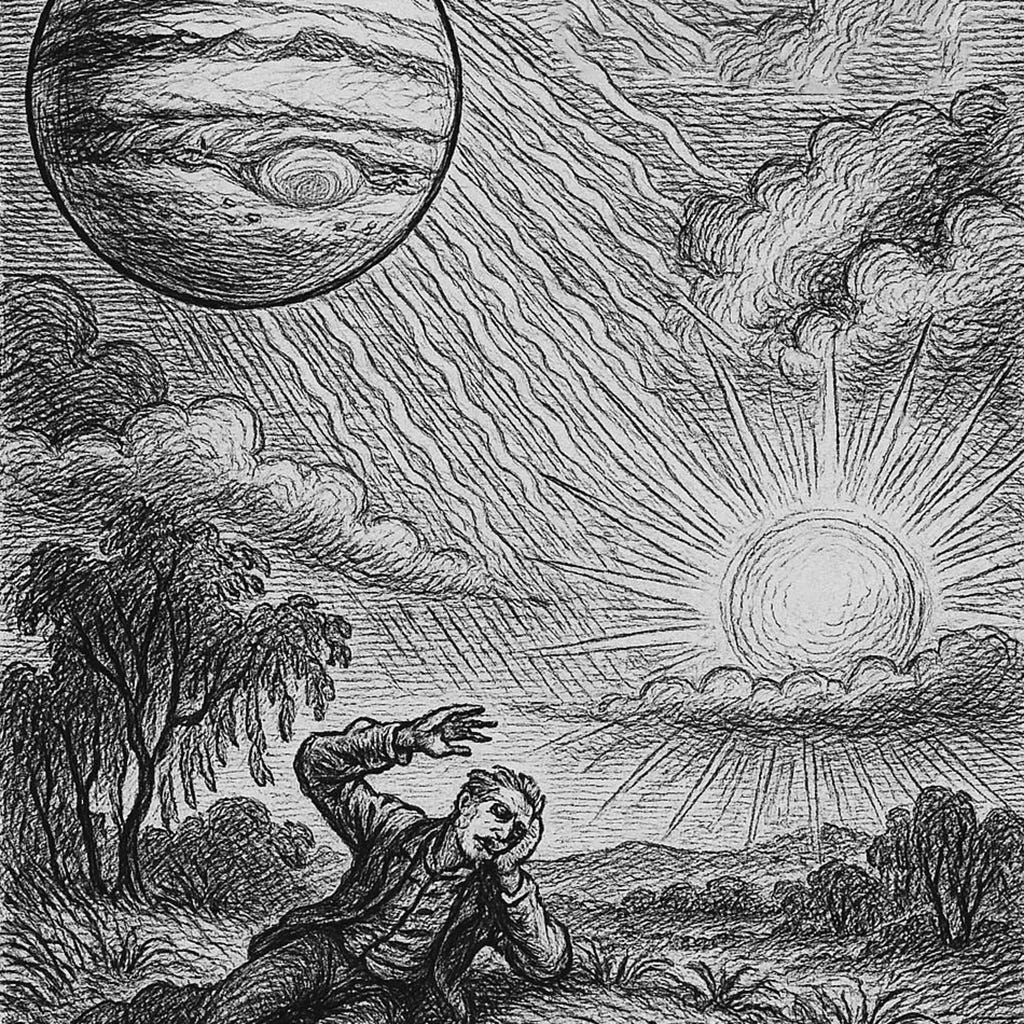Blaming Heatwaves on Jupiter
A super scorching Singular Discoveries summer special; PLUS The Martians, Pavement, and AI rewriting history
In 1800, the British astronomer RG Jenkins, a Fellow of the Royal Astronomical Society, gave a presentation to the Dulwich College Geological Club in which he attempted to explain that heatwaves were caused by the proximity of the planet Jupiter.
“In regard to high temperatures… for the last fifty years, a heat-wave has been observed to pass over the Earth every twelve years, nearly and contemporary with the arrival of the planet Jupiter about perihelion, and we are on the eve of the next heat-wave.”
Jupiter’s perihelion is the point in its orbit at which it is closest to the Sun.
By contrast, cold waves, Jenkins said, were caused by a disturbing effect of the planet Venus, which was so great that “the earth was materially pulled out of its orbit.” Cold waves “roll through the atmosphere on average every eight years”. Jenkins predicted that the temperature would be below average for the next forty years, “as it has during the past forty years been above average”.
Jenkins was actually on to something. Today, we know that planetary proximity does affect the Earth’s climate, albeit to a much smaller degree than human activity.
In 2024, scientists discovered that the gravitational impact of Mars influences the Earth's climate by drawing us closer to the sun in cycles of approximately 2.4 million years. Humans, meanwhile, have succeeded in altering the climate through a cycle of industrial activity that spans just a few hundred years.◆
Recommended
Book: The Martians by David Baron
Subtitled “The True Story of an Alien Craze that Captured Turn-of-the-Century America”, this book chronicles the fairly widely held belief during the early 1900s that astronomers had discovered intelligent life on Mars. Much of this craze stemmed from the work of Percival Lowell, who claimed to have observed canals on the red planet that he believed were used for irrigation. Baron follows Lowell and introduces us to other astronomers who support and contradict his claims, and provides an entertaining look at how the Martians craze created speculation and science fiction.
The Martians is published in the UK on Kindle on 26 August, and in hardcover in October. You can find it on the Singular Discovieres Amazon bookshelf.*
Film: Pavements
Pavements is an extremely unusual film from writer-director Alex Ross Perry about the indie rock band Pavement, who I was a big fan of back in their 1990s heyday. It’s essentially a behind-the-scenes documentary covering a comeback tour, a biopic movie, a jukebox musical, and a touring museum exhibition, much of which blurs the lines between fiction and reality. One strand follows the supposed biopic Range Life, with Stranger Things actor Joe Keery as lead singer Stephen Malkmus and Jason Schwartzman as record label boss Chris Lombardi. But does Range Life really exist, or were the “behind the scenes” sections shot just for this film? The audience is never quite sure which of the strands are completely real. I found it really interesting, but I’m a Pavement fan. Viewers who aren’t fans of the band will likely find it a less rewarding watch. It certainly sent me off on a binge-listen of Pavement’s music for a couple of weeks.
(I also learned that a 1999 Pavement B-side, Harness Your Hopes, became a viral hit on Tik-Tok in 2020 and is now by far their most-streamed song, a fact that is every bit as odd as the Pavements film, and probably says much about how songs gain traction in the modern music industry. Alex Ross Perry made a video for that song, too.)
Pavements is available to watch in the UK on MUBI. You can watch with a free 7-day trial via Amazon.*
Article: AI Is Poised to Rewrite History, Literally by Bill Wasik (New York Times Magazine)
A nuanced, first-hand look at how AI tools like Google’s NotebookLM are beginning to transform historical research and nonfiction writing. I’ve found NotebookLM to be among the most useful AI tools I’ve tried, helping me to examine large numbers of historical sources quickly (if not always perfectly). Wasik’s article raises concerns about bias, accuracy, and how machine summarization could reshape what kinds of histories get told. You can read it here.
Notebook
In case you missed it, here’s a catch-up on some recent posts and articles:
Birthplace of the Working Class (Tribune Magazine)
Oliver Cromwell and the Vampire’s Grave (also published in Northern Earth)
Coffee Johnny and the Winlaton Wild Man
How to be Wise, Happy, Useful, and Rich
The Prince and the Secret Tunnel
These posts also contain recommendations for Killing Thatcher, Extrasensory, Manhunt, Hellhound on his Trail, A Thread of Violence, All That Glitters, The Rehearsal, and Gaza: Doctors Under Attack, plus musings on AI, big tech, the Calvine UFO, a lost Beatles demo tape, Amelia Earhart, Brian Wilson, The Rocketbelt Caper, and more.
I’m working on some bigger projects at the moment, all of which will be revealed in coming editions of the newsletter.
If you know someone who might like Singular Discoveries, please share it with them and invite them to subscribe.
To close this summer edition, here’s a recently unearthed video for a Pavement song from 1992 called Summer Babe.
Thanks for reading!
*This publication features Amazon affiliate links. If you use them, I may receive a few pennies to help fund the newsletter. See our Amazon bookshelf here.



Another excellent article Paul. I really enjoyed reading it.